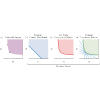Comparison of estimation limits for quantum two-parameter estimation
引用次数: 0
Abstract
Measurement estimation bounds for local quantum multiparameter estimation, which provide lower bounds on possible measurement uncertainties, have so far been formulated in two ways: by extending the classical Cramér-Rao bound (e.g., the quantum Cramér-Rao bound and the Nagaoka Cramér-Rao bound) and by incorporating the parameter estimation framework with the uncertainty principle, as in the Lu-Wang uncertainty relation. In this work, we present a general framework that allows a direct comparison between these different types of estimation limits. Specifically, we compare the attainability of the Nagaoka Cramér-Rao bound and the Lu-Wang uncertainty relation, using analytical and numerical techniques. We show that these two limits can provide different information about the physically attainable precision. We present an example where both limits provide the same attainable precision and an example where the Lu-Wang uncertainty relation is not attainable even for pure states. We further demonstrate that the unattainability in the latter case arises because the figure of merit underpinning the Lu-Wang uncertainty relation (the difference between the quantum and classical Fisher information matrices) does not necessarily agree with the conventionally used figure of merit (mean-squared error). The results offer insights into the general attainability and applicability of the Lu-Wang uncertainty relation. Furthermore, our proposed framework for comparing bounds of different types may prove useful in other settings.

量子双参数估计的估计极限比较
局部量子多参数估计的测量估计限为可能的测量不确定性提供了下限,迄今为止有两种方法:通过扩展经典克拉梅尔-拉奥限(例如量子克拉梅尔-拉奥限和长冈克拉梅尔-拉奥限),以及通过将参数估计框架与不确定性原理相结合(如鲁-王不确定性关系)。在这项工作中,我们提出了一个通用框架,可以直接比较这些不同类型的估计极限。具体来说,我们使用分析和数值技术比较了 Nagaoka Cramér-Rao 约束和 Lu-Wang 不确定性关系的可实现性。我们表明,这两个极限可以提供物理上可达到的精度的不同信息。我们举例说明了这两个极限提供了相同的可达到精度,以及 Lu-Wang 不确定性关系即使对于纯态也无法达到。我们进一步证明,在后一种情况下无法达到的原因是,支撑鲁-王不确定性关系的优点数字(量子和经典费雪信息矩阵之间的差异)并不一定与传统使用的优点数字(均方误差)一致。这些结果为 Lu-Wang 不确定性关系的一般可实现性和适用性提供了启示。此外,我们提出的比较不同类型界限的框架可能会在其他环境中证明是有用的。
本文章由计算机程序翻译,如有差异,请以英文原文为准。
求助全文
约1分钟内获得全文
求助全文

 求助内容:
求助内容: 应助结果提醒方式:
应助结果提醒方式:


